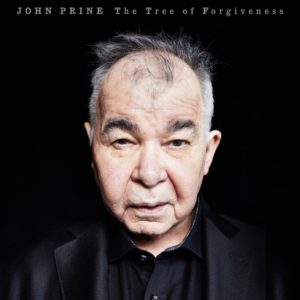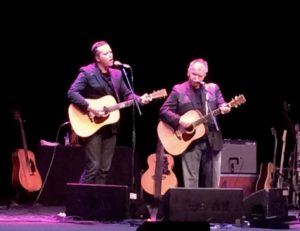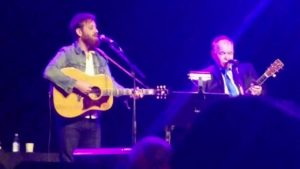Interview: John Prine – Hotfooting It To Auckland
The word legendary is bandied about a lot these days, but really, they don’t come much more legendary than John Prine.
The 72-year-old singer/songwriter is responsible for some of the most beloved songs of the past 50 years…tunes like Hello In There, Angel From Montgomery and Sam Stone.
So, Kiwi music lovers were thrilled when news broke that John Prine would perform three NZ shows as part of his Tree Of Forgiveness Tour.
Wednesday 27 February – Bruce Mason Centre | Auckland
Thursday 28 February – Isaac Theatre Royal | Christchurch, NZ
Saturday 2 March – TSB Arena | Wellington, NZ
And now he’s here!
The 13th Floor’s Marty Duda was given an opportunity to talk to Prine just after he arrived in Auckland, although by the time they chatted, he had already visited the fabled West Coast beaches.
Click here to listen to the 13th Floor interview with John Prine:
Or, read a transcription of the interview here:
JP: Hey Marty, how are you doing?
MD: I’m good! How are you today?
JP: Very good, thanks.
MD: Now, my understanding is that you’re already in New Zealand, is that right?
JP: Yeah, we’re in Auckland.
MD: You’re in Auckland! I’m in Auckland as well.
JP: Oh, right.
MD: Now, you’ve been to New Zealand before, is that correct?
JP: Yeah, just once. It was back in the early 90’s.
MD: Ah, okay. So a lot has –
JP: Yeah, we came in and played the show the next night, and had to go back to Australia the next day.
MD: Oh, that’s a shame. Well, you’re getting a chance to see a little bit of the country this time around, are you?
JP: Yeah, we’re going to go to the South Island tomorrow for about four days. Just kinda tour around.
MD: Ah hah. And what have you seen so far? Anything interesting?
JP: Ah, we went to a couple of beaches, and the other day, Fiona and I went to a beach over on the West Coast, and walked for an hour across the beaches – the sand was so hot, the soles of my shoes came off.
MD: Oh, man. Yeah, you gotta be careful of that black sand.
JP: I had to find a shoe repair place and the guy told me, he could tell – he could tell by the colour of the sand, where we’d been.
MD: No doubt. Well, I’m glad you’re getting time to settle in and see some of the place – it’s pretty cool. And I’m really happy that we’re gonna get a chance to hear you perform, in a little while. So – I’d like to – well, I mean, talk to you a bit about the album, and what you’re planning on doing. It was like, thirteen years in between albums – had you kind of given up on releasing new music? And then something happened to make you wanna do it again?
JP: No, actually, to tell you the truth, um… Uh, the last – oh, ten to fifteen years – we started getting a lot of…besides the regular fans who’ve been coming… for years we started to get a lot of young people, coming to the shows, and the audience was growing. And I mean, we were pretty much picking and choosing where we wanted to play, because things were going so well. And the time just got away from me. Things were going so good on the road, I forgot to put records out.
MD: Well, I guess that’s a problem when you have your own record company, you don’t have somebody kind of breathing down your neck, begging you for the next release. Is that part of it?
 JP: Well, Fiona [Whelan], my wife, is my manager now. And our son is running the record company. The two of them came to me about three years ago and said, “We need a record.” So they, uh, booked me into a hotel in Nashville, because they know that I operate in hotels than I do at home. And, they gave me a bunch of boxes of my unfinished lyrics, four guitars, and a ukulele, and I came out a week later with The Tree of Forgiveness.
JP: Well, Fiona [Whelan], my wife, is my manager now. And our son is running the record company. The two of them came to me about three years ago and said, “We need a record.” So they, uh, booked me into a hotel in Nashville, because they know that I operate in hotels than I do at home. And, they gave me a bunch of boxes of my unfinished lyrics, four guitars, and a ukulele, and I came out a week later with The Tree of Forgiveness.
MD: Very good. It’s that easy, is it?
JP: Yes. It – it – They had to remind me, right, “You haven’t had a record in a long time.”
MD: And you’ve co-written a lot of the songs with other people. Um, so – is that something new for you, or is that something you planned on doing all along?
JP: Over the years, it turns out that – since I moved to Nashville, I moved there, thirty…five years ago. And almost everybody you meet is a songwriter. But I only write with people who are friends, that, you know, people who I’d like to spend some time with. That way, even if you don’t get a song out of it, you still have a good day, you know.

MD: Yeah, yeah. So, how did – a guy like Jason Isbell, how did you meet up with him and become friends?
JP: Uh, Jason told me that I was a big influence on his songwriting. And he was doing one or two of my songs in his concerts, so we started doing some shows together. We were playing places that Jason could have sold out on his own, like CUE Nights, and he’d come there and open for me.
MD: Nice one. Do you pay a lot of attention to when people cover your songs? Like, I just noticed that The Lemonheads just put out a new album, and they cover your Sound of the Speed of Loneliness, if that’s something that enters your realm – your orbit at all.
JP: Yeah, I heard that just the other day. Sounded really good.
MD: Ah. Do you have any favourite versions of things that people have done? Whereas, like maybe Bonnie Raitt, or….
JP: I always liked Bonnie’s Angel From Montgomery. I mean, she was responsible for getting that song – whenever I hear a girl singing Angel From Montgomery I can tell, that they got it off of Bonnie’s record, cause her version’s different to mine.
MD: Yeah, I just went to a concert last week, it was on Valentine’s Day, and it was a local female artist, and she sang a version of it, and it just goes to show, you know, I mean that song just goes on and on.
JP: Yeah, Susan Tedeschi does a really good version, too.
MD: Oh, okay. Now there was a song on the album that I wanted to ask you about, its called I Have Met My Love Today. And… to my ears, I kinda heard a Buddy Holly And The Crickets style vibe going on, on that, especially with the drumming, and something in the lyrics. And I was wondering if Buddy Holly was somebody that you were kind of connecting with on that song.
JP: Oh, definitely. I mean, I wrote that with my good buddy Roger Cook, and Roger’s from… he’s from Bristol, England, and he’s about five years older than me. He said Buddy Holly was huge over in England before he got killed – like a lot of musicians over in England, The Beatles, all those people, Buddy Holly, they hold him up on a really high pedestal. So me and Roger were trying to write a kind of Buddy Holly song, when we wrote that.
MD: You definitely hit the nail on the head with that one.
JP: Thanks.
MD: And Dan Auerbach is another person you’ve been writing songs with. How did you get together with him?

JP: Dan was introduced to me through a friend of ours, David Ferguson. And uh, me and Dan, we kinda hit it off like, right – we didn’t write, right away, we spent a couple years later after we’d met. But I thought we were …there was four of us in a room… I thought we were writing songs for Dan’s solo record. And he’d only cut two of the five songs, so when I got ready to go in the studio, I looked at the other songs, which were Caravan of Fools and Boundless Love. I started singing ‘em, so they sounded – they sound like John Prine songs.
MD: And what do you think of as a John Prine song? Is there something in your head that tells you that, yup, that’s one of mine?
JP: Well, the song Boundless Love, off of Tree of Forgiveness, it had a – I replaced the second verse, when I started thinking about recording it for myself. I think it was the word – he had something about – he wanted the woman to cook him some food—
MD: Some pork chops!
JP: Yeah, I think the word – yeah, it’s more John Prine than “some food”. And I had to – I put the verse in about “my heartbeat was like a washing machine, it bounces around ‘til my soul comes clean.” That’s kinda more John Prine than Dan Auerbach.
MD: Right, gotcha. And I was thinking, I was listening to the album and some of the – especially like, the last tune on it, it’s beautiful – and obviously it’s about carrying on to the afterlife and whatever, and a lot of songwriters when they’re quite young, and you included – write songs about growing old and death, whatever, but then – on the other end of your career, you end up doing the same thing. Is there a difference in approach, doing it when you’re in your twenties than say, when you’re doing it in your seventies?
JP: [Laughs] Actually, I don’t think so. I think, when I’m writing songs, I think I’m nine years old. I never really think about mortality.
MD: That’s amazing.
JP: I started that song, When I Get To Heaven, I had the chorus already. And like, it’s about getting a drink, and a cigarette that’s nine miles long. I had to – it was kind of my private happy hour song. But I had to stop singing it myself. I’m a two-time cancer survivor, so I gave up cigarettes around, almost… let’s see, thirty-seven years ago.
MD: Good move.
JP: And so, every once in a while, when I see somebody light one up, I get really, really jealous.
MD: I do love the way you worked a kazoo into the song, as well.
JP: Well, the song seemed so ridiculous, we felt kazoos was the only thing that would work.
MD: So when you – when you’re going to do your show – you’ve only been to New Zealand once before, you, with this huge backlog of amazing songs that you’ve written, what – how do you determine what you’re gonna play?
JP: Well, we’re still doing The Tree Of Forgiveness tour, so we’ll play almost the new record in its entirety, like over the period of time – we do a two hour show – and then we try to fit as many of the old classics in as we can. I’ve never done a show without Sam Stone and Angel From Montgomery, and Hello In There, Paradise… they’re always there, every show. And then we try to get to some of the other ones – as many as we can.
MD: That’s a relief.
JP: I’m hearing that I have to add a few more to these shows because I haven’t been here in so long.
MD: Right. Well, you mentioned Hello In There, and it’s one of the first songs of yours that I was exposed to, because of the Bette Midler version, and I was wondering what you thought of her version, when you first heard it.
JP: I love that version, especially live, when she was doing that tour. That was her encore song. She’d come out – she had about – she had this huge orchestra, led by… Barry Manilow was her conductor. He was on the road with Bette. And then Bette had the dancers and The Harlettes, singing with her. And at the end of the show, when she gave an encore, she’d come out alone, with just Barry Manilow on the piano, and she’d sing Hello In There. It was amazing. Pretty cool.
Click here to see John Prine and Tyler Childs at the TSB Arena in Wellington on March 2nd.
- Adam Hattaway & The HauntersJuly 25, 2024Wine Cellar (13th Floor Concert Review) - July 26, 2024
- New Music Friday: 13th Floor New Album Picks: July 26, 2024 - July 26, 2024
- Holly Arrowsmith – Blue Dreams(Leather Jacket Records) - July 25, 2024
